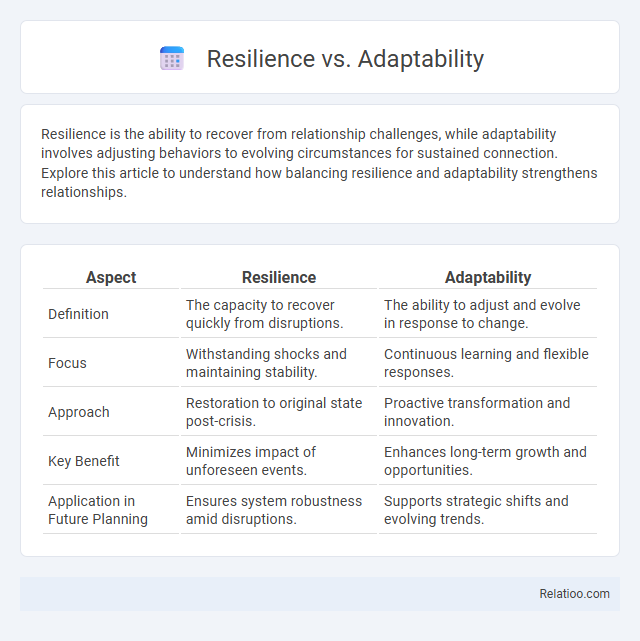Resilience is the ability to recover from relationship challenges, while adaptability involves adjusting behaviors to evolving circumstances for sustained connection. Explore this article to understand how balancing resilience and adaptability strengthens relationships.
Table of Comparison
| Aspect | Resilience | Adaptability |
|---|---|---|
| Definition | The capacity to recover quickly from disruptions. | The ability to adjust and evolve in response to change. |
| Focus | Withstanding shocks and maintaining stability. | Continuous learning and flexible responses. |
| Approach | Restoration to original state post-crisis. | Proactive transformation and innovation. |
| Key Benefit | Minimizes impact of unforeseen events. | Enhances long-term growth and opportunities. |
| Application in Future Planning | Ensures system robustness amid disruptions. | Supports strategic shifts and evolving trends. |
Understanding Resilience: Core Concepts
Resilience encompasses the capacity to recover quickly from difficulties by maintaining psychological strength and emotional stability in the face of adversity. Adaptability refers to the ability to adjust behaviors, strategies, or approaches in response to changing circumstances or environmental shifts. Understanding resilience involves recognizing its core concepts: emotional regulation, cognitive flexibility, and social support networks that collectively sustain mental well-being during and after stress.
What is Adaptability? Key Definitions
Adaptability refers to the ability of individuals or systems to adjust effectively to changing environments and evolving circumstances. It involves flexible thinking, learning from new experiences, and modifying behaviors to meet emerging challenges. Key definitions highlight adaptability as a critical skill for resilience, enabling sustained performance and growth amid uncertainty.
Differences Between Resilience and Adaptability
Resilience refers to the ability to recover quickly from setbacks and maintain core functions under stress, while adaptability is the capacity to adjust behaviors, strategies, or mindsets in response to changing environments. Your resilience allows you to withstand challenges without losing stability, whereas adaptability enables you to evolve and thrive amid uncertainty. Understanding these differences helps optimize personal growth and organizational performance in dynamic contexts.
The Role of Mindset in Building Resilience
Mindset plays a crucial role in building resilience by shaping how you perceive and respond to challenges, enabling effective adaptation to change and recovery from setbacks. A growth mindset encourages learning from failures and strengthens your ability to bounce back, whereas a fixed mindset may hinder resilience by fostering fear of failure. Cultivating optimism, emotional regulation, and cognitive flexibility enhances both adaptability and resilience, supporting long-term mental and emotional well-being.
Adaptability in a Fast-Changing World
Adaptability enables you to thrive in a fast-changing world by embracing flexibility and continuous learning, essential traits for responding effectively to unpredictable challenges. While resilience helps recover from setbacks and strength maintains consistency, adaptability drives proactive change and innovation, ensuring long-term success amidst evolving environments. Prioritizing adaptability empowers you to pivot strategies and seize new opportunities faster than competitors.
Benefits of Cultivating Resilience
Cultivating resilience enhances your ability to recover quickly from setbacks, reducing stress and improving mental health. It fosters emotional strength and perseverance, which are critical for navigating challenges and maintaining long-term well-being. Building resilience also supports better decision-making under pressure, empowering you to thrive in dynamic and uncertain environments.
Advantages of Being Adaptable
Being adaptable allows you to navigate change with flexibility, enhancing problem-solving skills and fostering innovation in dynamic environments. Adaptability promotes continuous learning, enabling quicker recovery from setbacks compared to solely relying on resilience. This skill increases your competitiveness and effectiveness by helping you adjust strategies to evolving circumstances and emerging opportunities.
Real-Life Examples: Resilience vs Adaptability
Resilience is the ability to recover quickly from setbacks, demonstrated by athletes who train through injuries to return stronger, while adaptability involves adjusting strategies to new conditions, such as businesses pivoting operations during market disruptions. Your capacity to remain resilient ensures perseverance through challenges, whereas adaptability empowers you to modify your approach dynamically for ongoing success. Both qualities complement each other by enabling effective responses to adversity and change in real-life scenarios.
Strategies to Enhance Resilience and Adaptability
Effective strategies to enhance resilience and adaptability include developing strong problem-solving skills, fostering emotional intelligence, and promoting a growth mindset to embrace change and overcome challenges. Building social support networks and engaging in continuous learning encourage flexibility and the capacity to recover from setbacks. Consistent practice of stress management techniques, such as mindfulness and positive reframing, further strengthens the ability to adapt and maintain resilience in dynamic environments.
Choosing the Right Approach for Personal Growth
Resilience is the ability to recover quickly from setbacks, while adaptability involves adjusting effectively to new situations; both are essential for personal growth but serve different purposes. Choosing the right approach depends on your specific challenges--resilience helps you bounce back from adversity, whereas adaptability allows you to thrive in changing environments. By understanding when to rely on resilience or adaptability, you can enhance your capacity for continuous self-improvement and achieve your growth goals more efficiently.

Infographic: Resilience vs Adaptability
 relatioo.com
relatioo.com